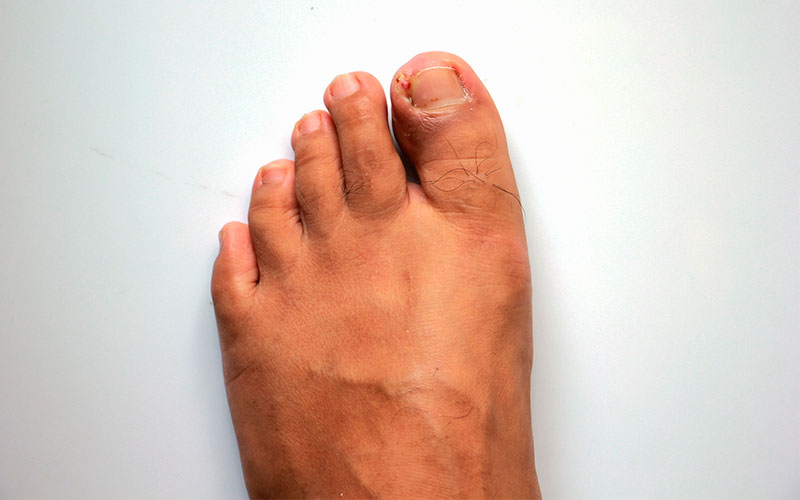Ingrown Toenails
There are many reasons that you might develop an ingrown toenail, from cutting your nails too short, to wearing shoes that don’t fit properly. However, whatever the cause, it’s important to know when to get help.

At Northwest Surgical Specialists, we offer expert intervention and treatment for ingrown and infected toenails, as well as continuing education to assist our clients in reducing the occurrence of future ingrown toenails.
What is an ingrown toenail?
An ingrown nail is when the skin on the sides of a nail grows over the edges, or when the nail grows into the skin. This can lead to pain and swelling at the corner of the nail and may lead to infection in the area.
What are the most common causes of ingrown toenails?
Here are five common causes:
- Improper-fitting shoes – squeezing your feet into shoes at are too small or too narrow may lead to ingrown toenails.
- Nail trauma – dropping something on your toe or stubbing it can result in ingrown toenails, particularly if it happens regularly, such as participating in a sport like running, ballet, or soccer.
- Incorrect nail care – many people cut their toenails too short, which encourages the skin to fold over the nail.
- Underlying conditions – adults with compromised arterial circulation due to diabetes or heart disease are more likely to develop ingrown toenails.
How do I check if I have an ingrown toenail?
You will first notice an ingrown toenail when it feels hard, swollen, and sensitive. While any toenails can become ingrown, it’s most likely that your big toe will be affected.
The ingrown toenail may become infected, and symptoms include:
- Pain when you put pressure on your toe
- Swollen, red skin around the nail
- Bleeding
- Skin growing over part of your toenail
- The development of a blister filled with pus
- Yellow toenails that are thick and cracked
When should you make an appointment to see a doctor?
Although there are a number of at-home interventions that can treat an ingrown toenail, once it becomes infected, it is important to seek medical care as prolonged infection can spread and have serious complications. Signs to watch for include:
- Redness, swelling, and pus
- A fungal infection
- Symptoms that don’t go away and worsen over time
You should make an appointment with a specialist immediately if you have poor blood flow, an impaired immune system, or a pre-existing medical condition such as diabetes.
What are the treatment options?
A doctor specializing in foot care will be able to determine the best course of action. In most cases, an ingrown toenail can be treated under local anaesthetic. The doctor may surgically remove a portion of the underlying nail bed, a portion of the nail, or some of the adjacent soft tissue. This is done to relieve the pain and allow the infection to heal. The surgery will prevent the nail edge from growing inward. It may also be necessary to take oral antibiotics.
For frequent, recurring ingrown nails, your doctor may suggest a matrixectomy done under local anaesthetic. The problematic nail portion is first removed and a chemical phenol is applied to kill the cells that form the nail, offering a more permanent solution.
Receive expert footcare
As a multi-medical practice, our specialist team of doctors have years of experience in treating foot conditions such as ingrown toenails. To schedule an appointment, please give us a call on 847-885-9525 or book through the website.